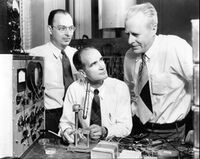Template:Are You Sure/October 13

• ... that physicist Walter Houser Brattain (10 February 1902 – 13 October 1987) shared the 1956 Nobel Prize in Physics with fellow scientists John Bardeen and William Shockley "for research on semiconductors and the discovery of the transistor effect"; that Brattain later collaborated with P. J. Boddy and P. N. Sawyer on several papers on electrochemical processes in living matter; and that Brattain became interested in blood clotting after his son required heart surgery?
• ... that priest and philosopher Nicolas Malebranche, Oratory of Jesus (6 August 1638 – 13 October 1715) sought to synthesize the thought of St. Augustine and Descartes, in order to demonstrate the active role of God in every aspect of the world; that although Malebranche is better known for his philosophical work, he also made notable contributions to physics, working within a broadly Cartesian framework; and that in 1699 he delivered an address to the Académie Royale des Sciences on the nature of light and color, wherein he argued that different colors resulted out of different frequencies in the pressure vibrations of subtle matter, much as different musical tones derived from different frequencies in the vibrations of air?
• ... that the San Pietro scrying engine is built into the portrait bust of Antonio del Pollaiolo in the church of San Pietro in Vincoli; that the engine was originally designed to simplify the process of creating liturgical calendars; and that, over centuries of use, the San Pietro scrying engine has accumulated the world's largest library of calendrical and theological subroutines?
